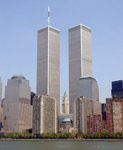
A Crack in Time
Former Secretary of State Rice shares 9/11 experience, insights
- By Megan Weadock
- Nov 06, 2009
As we all know, the events of Sept. 11 changed the security industry—and
the world—forever. Ten years ago, there was no such thing as the Department
of Homeland Security, and transportation security was unrecognizable
from what it's become. Today, terrorism and security are consistently popular
topics within government policy and in the media. Clearly, it was a day that reinforced
the importance of security forever.
Few people know more about protecting the United States than Condoleezza
Rice, former secretary of state and national security adviser. On Sept. 23, Rice
delivered the keynote address at the annual
ASIS tradeshow, which was held in
Anaheim, Calif.
An Inside Look
During the amazing speech, Rice discussed
foreign policy, revealed some of her greatest
achievements and disappointments,
and explained how important security professionals
are in a post-9/11 world.
"What you're doing in helping the ordinary
be more secure is actually a very major
part of fighting effectively in the war on
terror, and I want to thank you very much
for what you do every day," she said.
Rice spoke for about 50 minutes, including
a surprisingly substantive question-and-
answer session at the end. As everyone
knows, she's a phenomenal speaker, and
not surprisingly the talk was funny, informative
and, at times, very poignant.
Her discussion of 9/11 was especially
fascinating.
"I think we can all agree that that day
... was a watershed moment in the history
of the United States," she said. "It was like
a crack in time. Nothing has ever been the
same since Sept. 11."
Rice explained that the attacks on the
Pentagon and World Trade Center necessitated
a major shift in the way people
thought about safety and security in the United States. It was a change that led to
the creation of a U.S. military command and the Department of Homeland Security.
"Despite what you may think about the Department of Homeland Security,"
she said, the division, which is still relatively new, has already done wonders to unify
disparate government factions and the private sector against outside threats.
Moving Into the Future
Rice then moved to discuss some of the dangers facing the United States in this
post-9/11 environment. Today, failed states are the true threats, she said, because
they breed resentment, hopelessness, violence and poverty. And in situations like
Iraq and Afghanistan, international policing often gets complicated by international
diplomacy, which adds to the difficulty of modern foreign relations. As Rice
put it, diplomacy is much more in-the-trenches than it used to be.
"It's going out there and helping people solve their problems," she said,
from enabling small farmers in Guatemala to become self-sustaining to training
African soldiers.
Understandably, Rice avoided the Iraq War topic in particular. But she
made sure to remind the listeners how important it is to keep the bigger picture
in mind.
"Remember historical context," she
stressed. "Today's headlines and history's
judgments are rarely the same. And if you
govern for today's headlines, you will not
have history's judgments on your side."
Regardless of their political affiliation, it
was clear that everyone in the audience was
interesting to hear Rice's first-hand account
of 9/11. Like many Americans, when the
first plane hit the World Trade Center, she
thought it was simply an accident. But with
the second plane came the realization that
she and the rest of the administration were
dealing with an unprecedented situation.
"Throughout that day, we knew what it
was like to be at war with something that we
didn't fully understand," she said.
Constant Vigilance
Rice closed by again stressing the importance
of the security industry—at all levels—in
this new world. As 9/11 showed us, the rules
have changed.
"[The terrorists] took our effects of normal
life and turned them into the worst attack
on America's territory ever," she said.
Rice explained the scariest thing about the
attacks was that they didn't come from a missile
or a tank; instead, the terrorists used our
own airplanes, loaded with American citizens
and fuel. A similar attack could easily come in the form of a backpack or city
bus—which is why constant vigilance is key.
"It's the daily, everyday stuff around us that's dangerous," she said. "... Security
professionals need to worry about how to connect what might seem harmless or
ordinary to terrorists who are getting smarter and smarter."
Cleary, security professionals serve a vital role in our new world. Here's hoping
next year's keynote speakers will be as interesting and relevant to the industry as
Rice. See you in Dallas for ASIS 2010!
This article originally appeared in the issue of .